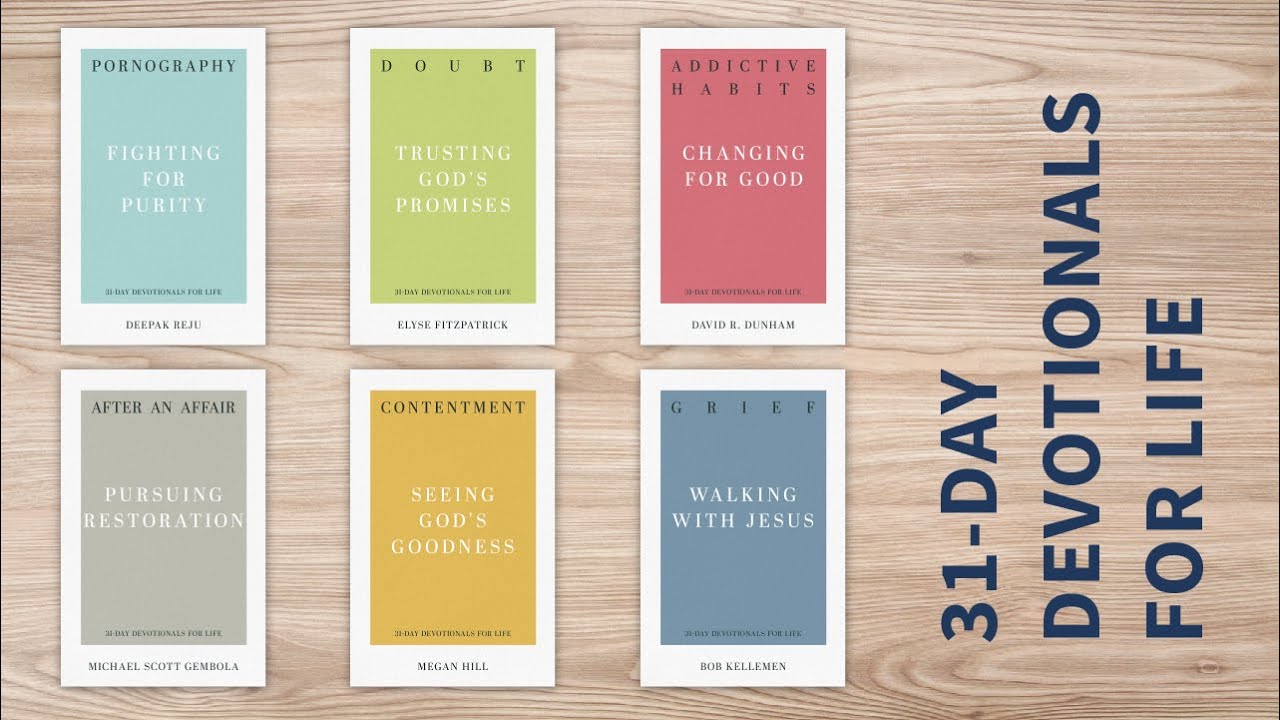|
by Pearson Johnson, Director of Student Care I wanted to take a few minutes in our blog to recommend a newer series of devotional books that have recently been published by P&R Publishers called "31-Day Devotionals for Life." This series makes a valuable contribution to the biblical counseling efforts of pastors and counselors as an additional means to help, by God's Word, strengthen those who are struggling with different life issues.
Deepak Reju, the series editor, is engaged in helping others not only as a writer and editor, but primarily as a pastor. He is an Associate Pastor at Capitol Hill Baptist Church, where he serves alongside of Mark Dever with primarily responsibility ot oversee the biblical counseling and family ministries of the church. A number of years ago, I had the privilege of talking to Deepak in his office at CHBC. He has a pastor's heart and burden to apply God's Word to the discipleship and counseling needs of church and community members. His entry in the series: Pornography: Fighting for Purity is very helpful. I am currently reviewing the devotional by David R. Dunham called Addictive Habits: Changing for Good. David is the Associate Pastor for Discipleship and Counseling at Cornerstone Baptist Church in Roseville, MI (Cornerstone is Pastored by BJU grad Bob Johnson). Dunham's main contention is that "God has much to say in his Word about addictions" (11). In each of the 31 day devotionals, a scriptural passage is given as the focus and a teaching of about two pages is provided with a point of reflection and application at the end. The devotional is designed to be a tool to accompany personal, pastoral, and counseling encouragement to help orient your thoughts and actions toward the gospel (13). Dunham divides his 31 days into four parts that form a structure for thinking about addictive habits. The first is responsibility. "Freedom begins with our willingess to accept our own role in cultivating our addictive habts" (16) . The second is relationship, reminding us that lasting change "doesn't happen simply through behavior modification," but through our relationship to Jesus Christ and his church (34). The third section, restructuring, is very practical in helping us change patterns of life to avoid and deal with the often inevitable temptations and failures that come with this struggle (53). Finally, the devotional concludes with remaining, a series of encouraging devotions on staying faithful for life (70). Dunham has structured the devotionals in a way that really helps us think biblically about the multi-faceted approach to fighting addictive habits. I concur with the way Reju describes the overall series of devotionals: "like rain filling up a bucket. It's slow and it builds over time" (9). Some of the greatest needs in a counseling relationship or personal struggle are not one-time revelations or someone with special knowledge, but the steady, personal application of God's Word through preaching, teaching, life-on-life ministry, and personal study. These "regular means of grace" remind us of truth, re-orient our minds and hearts, and redirect our path forward according to God's Word. I would recommend doing what I have done-- order a few of them for personal reading and then pass them on to those with specific needs in the areas addressed. You will find these devotionals to be very accessible, helpful and practical tools for growth and ministry. by Rachel Dahlhausen, Women's Counselor When I was a child, I always enjoyed the children’s workbook sheets that included little mazes on them. The kind where “Fido the puppy” was lost and needed help finding his way home. There were dozens of paths you could take with your pencil as you tried to lead him there, but only one that led to the center of the maze. Remember how you tried tracing your finger through the various turns and openings in the maze, hoping to discover the dead ends before you actually drew any lines, so that you didn’t make too many mistakes?
Life often feels like the maze on a child’s worksheet. Except that now you are living the ups and downs, the double backs and dead ends, and the repercussions are much greater than they were on your Sunday school handout. This year, because of the COVID crisis and the ever-changing predictions, suggestions, and mandates, it can feel like the target “home” on the maze has changed locations so many times you don’t know what to do next! I am writing this article on a day of mixed emotions because it would have been BJU’s graduation day and the closing of a semester of school. Students, congratulations! You have worked hard and done well. You have seen the Lord faithfully providing for you and enabling you to complete what you started. But as you look to do the next thing, you may find that the next thing evades you. Maybe the job you planned on working closed down. Maybe the state you live in is still under “stay at home” orders. Perhaps the summer ministry you were pumped about has had to postpone or cancel plans. You look at your google calendar and it stretches as empty and white as the Sahara desert. And it’s hard. Friend, it’s ok for it to be hard. The Lord told us that we would have tribulation in this world, and He sorrows with us in it. But what are you going to do with that sorrow? How are you responding to all the changes and uncertainties? What are you believing about God, about yourself, and about your circumstances? Here are two things I’ve tried to preach to myself. First, remember God and His providence. God’s providence is beautifully described in the Westminster Catechism as “His most holy, wise, and powerful preserving and governing of all His creatures and all their actions.” God is unchanging in every one of His perfect attributes (Mal. 3:6). God has not left me or forsaken me (Heb. 13:5). God has not been taken by surprise in this worldwide calamity; rather, He brought it (Amos 3:6). God’s ways are far higher and better than mine (Is. 55:9). He is the Rock upon which we can build our lives (Matt. 7:24-27). God promises to work good for those who love Him, even when sinful men attempt otherwise (Gen. 50:20). God’s providence, rightly understood, is one of the greatest comforts of a believer’s life. Try reading Psalm 139 with God’s providence in mind. As the puritan writer John Flavel wrote, “One word of God can do more than ten thousand words of men to relieve a distressed soul.” Read Trusting God by Jerry Bridges or The Mystery of Divine Providence by John Flavel. It will be time well spent; I assure you! By faith believe that God is wisely directing in every situation. Secondly, remember the big picture of God’s will for you this summer. We can get so caught up in “what is God’s will for me” questions as we consider where to work or live or what to do or who to marry. While the Bible does teach us that God has a specific plan for us, many of the verses of Scripture that refer to God’s will are focused on WHO we are rather than WHERE we are. For instance, 1 Thessalonians makes two direct references to God’s will. The first says, “For this is the will of God, your sanctification; that you abstain from all sexual immorality…” (1 Thess 4:3). The word sanctification is referring to living a holy life, a life that is more and more transformed to look like Jesus. Are you growing spiritually? Are you letting the beauty of Jesus’ face into your life through daily time in the Word (2 Cor. 3:18)? Are you praising and pouring your heart out to the One who bore all your griefs and who sits interceding before the throne for you (Rom. 8:34)? Are you putting sin to death in your life by abstaining from all forms of sexual immorality…movies or reading material or pornography or fantasy? This is God’s will for you! The second reference to God’s will in 1 Thessalonians is full of absolutes: “Rejoice always, pray without ceasing, give thanks in all circumstances; for this is the will of God in Christ Jesus for you” (1 Thess. 5:16-18). This admonition is immediately convicting to me. “Give thanks in all circumstances.” COVID-19 is a circumstance in my life. Summer uncertainty is a circumstance in my life. Cancelled vacation plans are a circumstance in my life. These are circumstances I didn’t choose and didn’t want. But in God’s good providence, they are in my life. Will I please Him by, in the power of the Holy Spirit, doing what 1 Thessalonians 5:16-18 says? If I obey in this way, I am absolutely living God’s will out for my life today! I am honoring Him today. I am fulfilling His purpose for me today. And there is comfort in that. The Heidelberg catechism, after defining God’s providence, asks an insightful second question: “What is the benefit of our knowing about God’s providence?” The answer, if you will take time to digest it, is precious. “The benefit of our knowing about God’s providence is that it makes us patient in adversity and thankful in prosperity, so that we may place our firm trust in our Heavenly Father concerning everything that befalls us.” Patient in adversity and thankful in prosperity. Firm trust in our Heavenly Father. I don’t respond that way nearly as often as I should, but I am learning to do so by God’s grace! As my pastor Mark Minnick said in a recent sermon, “There is something for you to pray today. There is something for you to say today. There is something for you to think today that will glorify God. Please the Lord with your steadiness, your firm conviction about the future.” So turn away from Netflix binging and all-night social media scrolling or endless, mind-numbing worry, and in God’s wise providence, live out what you know is His will for you today! by Matthew Weathers An empty inbox at the expense of an empty prayer closet is a terrible trade off.” –Garrett Kell These words hit me like a ton of bricks when I read them last week. I am someone who pursues an empty inbox and enjoys accomplishing tasks throughout the day. This quote was a helpful and convicting reminder that an empty inbox and a completed check-list do not constitute a truly productive day. There are countless needs in the world – from wiping the nose of a sick child, doing the laundry, changing the oil in the car, and responding to emails, to feeding the hungry, caring for the hurting, and sharing the gospel with the lost. Yet our days our numbered. What should we do? Concerning outreach, Jesus beckons his followers to consider the needs, to have compassion, and then to pray earnestly. When he saw the crowds, he had compassion for them, because "they were harassed and helpless, like sheep without a shepherd." Then he said to his disciples, “The harvest is plentiful, but the laborers are few; therefore pray earnestly to the Lord of the harvest to send out laborers into his harvest” (Matthew 9:35-38). Jesus taught that earnest prayer must precede reaping from the plentiful harvest. We must abide in His presence before we can abound with His produce. Roots before fruits. Concerning other needs, Paul instructs believers to bring their needs to God in prayer (Phil. 4) and to continue in prayer (I Thess. 5). Prayer is a priority to productivity because true productivity is not just getting things done but getting the right things done for God’s glory. And for that we all need wisdom and strength. Prayer is not a magic potion that ensures wonderful things will happen the rest of the day. God is not your genie. Prayer is time well-spent in the presence of God. It is simple and ongoing communication with Him directed by the truth of His Word and the delights and desires of our hearts. (As an aside, I highly recommend A Praying Life by Paul Miller.) Jesus himself perfectly modeled the balance of praying and working, which is really to say praying while working. And while we certainly aren’t perfect, we can seek to increasingly make prayerful productivity a priority each day “It doesn’t matter how efficient you are if you are doing the wrong things in the first place.” -Matt Perman, What’s Best Next |
AuthorSBlog posts are authored by the Student Development and Student Care & Discipleship Staff of Bob Jones University Archives
May 2020
Categories |




 RSS Feed
RSS Feed